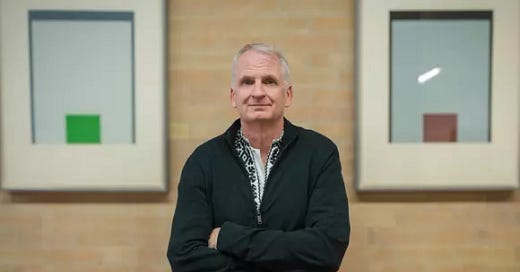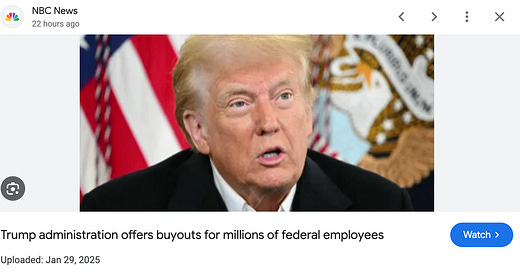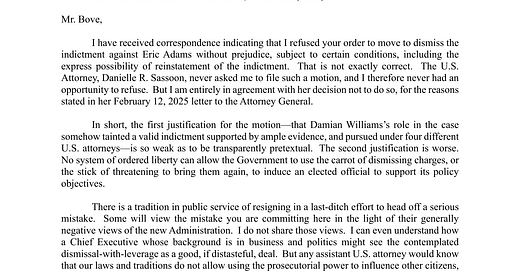
We read a lot in the media about young progressive voters who are disenchanted with Joe Biden. Some of the stories suggest they may look for a third-party candidate that aligns with their views. We are also told some young voters will just sit this one out.
Is it true? If it is, what can we do about it?
Tonight, our guest for Five Questions is Victor Shi. Victor is a recent UCLA graduate. At the age of 17, he was elected as the youngest delegate for Joe Biden in 2020. He has worked on campaigns ranging from the state and local level to presidential and has interned at both the DNC and the White House. While in school, Victor co-hosted a podcast called iGen Politics with my dear friend Jill Wine-Banks. In other words, Victor has a lot of energy and brings a lot of grassroots smarts to the issue of how young people vote.
A Civil Discourse reader wrote to me a couple of months ago, and her comments have stayed with me. Her point was that it is not enough just to encourage young people to vote, we need to truly dig into the issues that their generation cares about and talk to them about how a Trump presidency will decimate what matters most. She wanted to know how we could have conversations with younger voters around the idea that this is an election where none of us who care about the future of democracy can afford the luxury of waiting for a candidate who perfectly aligns with our values, but she was concerned that may seem a less reasonable proposition to younger voters who will have to contend with pressing issues like climate change in their lifetimes.
I believe in listening to the people closest to the issues when I’m struggling with an important problem. So tonight, we’ll hear answers to some of those concerns from Victor.
The “Five Questions With” editions of Civil Discourse are our opportunity for a deeper dive on important issues. I’m committed to keeping Civil Discourse available to everyone, without regard for ability to pay. Five Questions is my way of saying thank you to those who are able to support this work with paid subscriptions, which helps me keep it available for everyone. I really appreciate all of you who are here and committed to keeping the Republic!
Joyce: How important is the youth vote to presidential and other elections?
Victor: Very important. Young people have always been the ones to lead social movements and our voice is critical in the electoral process. That is especially true in this election because young voters (as it's traditionally defined, between the ages of 18-35) will compose the largest portion of the electorate. Quite literally, young people will be the deciding factor in elections up and down the ballot this cycle given the voting power we have. This new generation of voters is hungry. We are ready to make real, systemic change. We are voting. And, luckily, elected officials and campaigns are listening and doing a lot more work to engage us in the process.
Joyce: What are the important facts and statistics to know about historical patterns and trends with younger voters?
Victor: Historically, young people have voted at rates lower than older generations. There are numerous reasons—from a confusing electoral process to a general feeling of apathy about politics. But recent elections have started defying trends. This started in the 2018 midterm election when the first major share of Generation Z was eligible to vote. In that election, while still not as high as older generations, Gen Z voters turned out at a historic rate for a midterm election, with 30% of the voting-eligible population casting a ballot. In 2020, that number grew even higher with 50% of the voting-eligible Gen Z population turning out — the highest for a presidential election. And, in the 2022 midterm elections, young voters once again turned out in large droves and turned out just shy of 2018 at about 27%.
Beyond the raw turnout numbers among young people, another interesting statistic that I've noticed is how strongly young people are voting for Democrats at overwhelming rates. Take the 2022 midterm elections: CIRCLE, a civic research organization based out of Tufts University, found that young people voted for Democrats over Republicans by 28%, one of the largest gaps recorded in history. In my view, a large part of this is due to the way Republicans have taken away rights — and for my generation, this is simply not the reality we want to live in.
I'd pay attention to both the raw turnout numbers as well as the party preference among young people in this election. If 2018, 2020, and 2022 serve as precedents, this could be one of the strongest rejections of the Republican Party among young people.
Joyce: Many pundits have suggested that younger voters are disillusioned and don’t see much difference between Trump and Biden. They’ve suggested they may sit this one out or vote third party. On the other hand, I see enormous activism among young, highly motivated people like you who are committed to getting out the vote. What do you think the accurate picture looks like? Do younger voters understand that not voting for Biden is a vote for Trump, in essence, and what that means?
Victor: First of all, the notion that younger people don't see the threat that Donald Trump poses is, to me, one of the biggest misunderstandings of my generation. Young people are more diverse than any generation and the large majority of young people see Donald Trump as a racist, sexist, and bigot and don't need to be reminded of the threat he poses our democracy.
That said, I also don't want to say that all young people are passionate about President Biden like me either. From what I'm seeing and hearing, what makes this election different from 2020 is that young people want something concrete to vote for — not just someone to vote against. And, while it's easy to become frustrated with young people not seeing all the ways President Biden has delivered for them and be eager to re-elect him, it makes sense why they feel the way they do — especially in an environment in which young people do not consume traditional news. They don't watch cable (sorry, MSNBC!). They don't read print publications. Instead, they are highly online and primarily get their news from social media.
Fortunately, the Biden campaign realizes this reality clearly and that is why they have engaged heavily in a social media operation and going on TikTok. That's why they are enlisting influencers to convey the message. They know how differently young people are consuming news and they are meeting them where they are with a message that is two-fold: First reminding them of what President Biden has achieved for young people and promises to achieve for young people in a specific and personal way. Second, reminding young people the threat of what a second Trump term would entail — things like Trump promising to be a dictator on day one or Project 2025 and how that plan would send us into autocracy.
The last thing I'll say on this point is to give it some time. We are still going to do everything we can to reach young people in the months leading up to Election Day, but until the convention when it's set that it'll be Trump v. Biden again, expect two things: First, young people might still be open to exploring other options, and until the choice becomes crystal clear, there might be some openness in other candidates. Second, expect enthusiasm to really increase the closer we get to Election Day. As we all know, procrastination is real — and that is very pertinent for young people. Many of my friends don't study for finals until days before, so they most likely aren't thinking about the election until the time comes. But when it does, I suspect it'll be significant.
Joyce: What can the larger body politic do to support younger voters?
Victor: There's a lot that the larger body politic can do to support younger voters. The most important thing is supporting youth organizations — groups like Voters of Tomorrow and other Gen Z-led groups. They are the most under-resourced, under-funded groups out there but doing incredible work in getting out the youth vote. Every dollar matters, so if you can either volunteer or donate any money, it goes such a long way. The same is true for any young person running — if you see a young person running, make an effort to help out financially. They don't go at this after having lucrative careers in business or law. They are young people eager and committed to making a difference and serving their constituents.
The other thing I'd say is to find and amplify Gen Z activists. One of the most amazing things about being in the youth space is seeing how many young people are out there making their voices heard and finding creative ways to effect positive change. Whether it's David Hogg or Olivia Julianna or Greta Thunberg, young people are finding innovative and unique ways to raise awareness about the issues and turn out the vote. Find young activists on social media and amplify their voices because we need that representation on our timelines and in politics.
Joyce: Civic education seems to be lagging in our country. And increasingly, Republicans are politicizing education. What do you think are the good options for making sure the next generation is educated about how the Constitution, our rule of law, and government work? What can readers here at Civil Discourse do?
Victor: I think about this question a lot and the lack of civics education is such a big problem. I think about this in two different ways. The first is directed at the Civil Discourse community specifically — and it's the idea of trusted messengers. Understand that your voice matters far more to any young person than a politician or anyone on cable news. If you know a young person, sit down with them, ask them about the issues they care about, and help guide them through the electoral process. For young people moving around the country and registering to vote — often in states that have complex voting laws — your guidance is crucial. These intergenerational conversations and efforts are really important and aren't happening enough (it's why I created a podcast with Jill Wine-Banks, a former Watergate prosecutor, that emphasized the importance of intergenerational conversations).
The second is getting young people to embrace the civics lifestyle in their local communities. The phrase, "embrace the civics lifestyle" is something my AP government teacher told his class and I love it — the central thesis of this is that civics and participating in our democracy is more than just a class or an election every year. It's part of who we are. It's part of our lifestyle. The more we can get young people to realize that change happens at the local and state level far quicker and more meaningfully than the national level, the more it empowers them to start making a difference, getting involved, and embracing the civics lifestyle.
We are in this together — and we all have a role to help empower, engage, and educate the young people in our lives.
Victor says it best. It’s true.
We’re in this together,
Joyce
















Joyce At 90 I am galvanized to energize my age group to join the Voters of Yesterday. I have been checking obituaries to make sure that my volunteer list is up to date. We have purchased oil for the wheel chairs and new rubber tips for the canes.
Unfortunately, we cannot assemble to proselytize at early morning commuting stations. Anything before 9 a. M. Is not possible. Also, with dinner @6 and darkness coming shortly thereafter, driving at night is verboten.
We have a slogan 90S FOR BIDEN and are galvanizing against Trump. Another slogan is DEMOCRACY NOW AND FOREVER.
We’re all in this together!
I love everything about this. Thank you, Joyce, for bring Victor's voice to this community. Really enjoyed his advice on how to better engage with young voters and support their efforts. About to donate to Voters of Tomorrow.